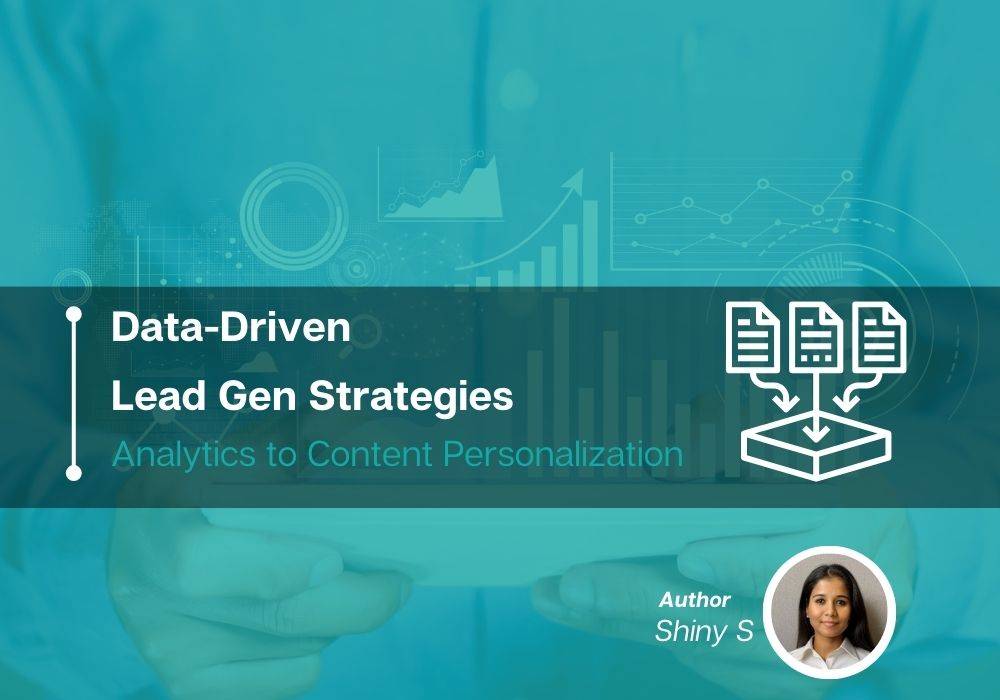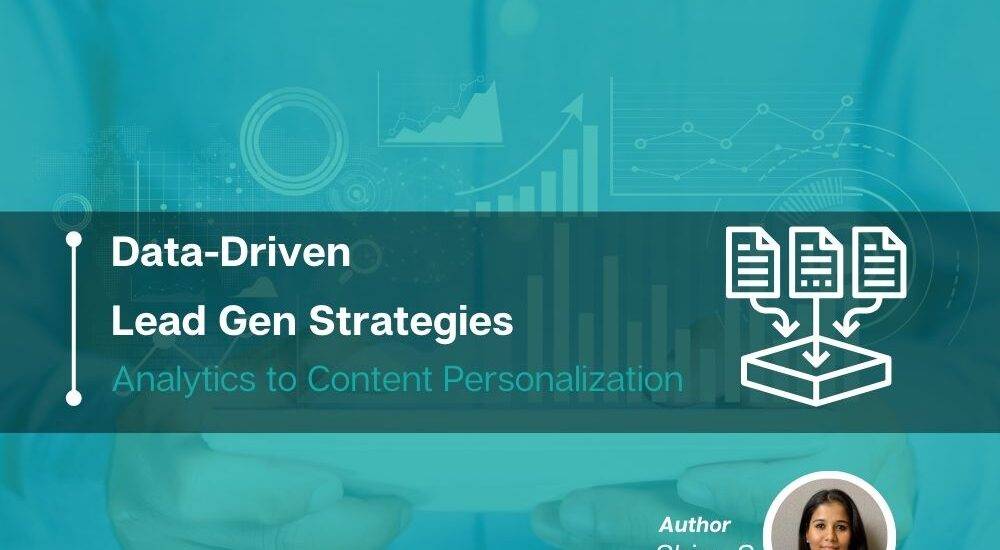Data-Driven Lead Gen Strategies
Using analytics to Personalize content and optimize campaigns

In this fast-paced digital era, businesses Repeatedly look for innovative ways to generate leads and make conversions. The most powerful tool for their destruction is data analytics. Marketers can gain valuable insights into customer behaviour, preferences, and trends, allowing them to create highly personalized and targeted lead-generation strategies by utilizing their data. In this article, let’s explore the importance of data-driven lead generation, dig into analytics, and provide basic practical strategies to personalize content and optimize campaigns for higher impact.
Why Data-driven Lead Generation Matters in 2024?
Marketers relied on Intutions and Spray or Pray methods to Reach Potential Customers in the Past. But in today’s digital age, Consumers are sharply overwhelmed with information demanding Personalization to their preferences and needs as a differentiator. Data holds as a Key for this Level of understanding. Therefore, Blending data-driven strategies into lead-generation efforts is a trend; it’s a need for competition in the market.
Below are some reasons why data-driven lead generation matters:
- Data-driven lead generation allows businesses to identify and target particular audience segments with a higher possibility of conversion. Analyzing data helps to understand customer behavior, preferences, and demographics, enabling more accurate targeting.
- Businesses can allocate resources more efficiently by leveraging data. It focuses its marketing efforts on channels that give the best results, reducing wasted resources on ineffective strategies.
- Data-driven approaches enable businesses to personalize their market campaigns and Messages. Customizing content and offers based on customer data leads to more engaging interactions, increasing the chances of converting leads into customers.
- Businesses can measure and analyze the performance of their marketing campaigns with data-driven lead generation, which helps strategy optimization, ensuring that resources where they can generate the highest return on investment.
- Data allows businesses to understand customer behavior, enhancing the overall customer experience. By anticipating customer needs and preferences, companies can provide more personalized and satisfying interactions, encouraging loyalty and repeat business.
- Data-driven lead generation provides real-time feedback, enabling businesses to adapt quickly to changing market conditions. This agility is crucial for staying competitive in dynamic industries and responding promptly to shifts in customer behavior.
- Data utilization helps in evaluating the quality of leads more accurately. Lead scoring models can be developed by businesses to prioritize and focus their efforts on leads.
- Data-driven lead generation encourages a culture of continuous improvement. Analysis and optimization in businesses can refine their strategies, learning from both successes and failures to evolve and stay ahead of the competition.
- Data-driven approaches provide measurable metrics that allow businesses to track the performance of their lead-generation efforts. This data-driven accountability ensures that marketing efforts align with overall business goals.
Benefits of Data-Driven Lead Generation:
- Higher Conversion Rates.
- Improved Efficiency.
- Enhanced Customer Experience.
- Data-Backed Decisions.
- Continuous Optimization.
Understanding the Role of Analytics: Analytics plays a pivotal role in data-driven lead generation by gathering, analyzing, and interpreting systematic approaches to data. Businesses can gain a deep understanding of customer behavior, preferences, and the effectiveness of their marketing efforts.
Here are some ways in which analytics contributes to successful lead-generation strategies:
Customer Profiling: Analytics allows businesses to create detailed customer profiles by analyzing data such as demographics, behavior on the website, and past interactions. This information is crucial for tailoring marketing messages and offers to specific targeted audiences.
Behavioral Analysis: Customer behavior tracked on websites, social media platforms, and other digital channels helps businesses identify patterns and trends. Enabling them to anticipate customer needs, personalize content, and create targeted campaigns that resonate with their audience.
Evaluating Campaign Performance : Analytics tools Give insights into the performance of marketing campaigns. Businesses can measure key metrics such as click-through, conversion rates, and customer engagement. These metrics analysis helps in identifying successful strategies and areas for improvement.
Attribution Modeling: Understanding how different touchpoints contribute to lead generation and conversion is critical. Analytics helps to value each interaction in the customer journey, providing a comprehensive view of the customer’s path to conversion.
Optimizing Campaigns Through Analytics:
Data-Drive Decision Making: Analytics entitle marketers to make informed, data-driven decisions. Instead of intuitions, User and performance metrics optimized on Campaigns that ensure resources to strategies that have proven success and allow for quick adjustments in real-time.
A/B Testing for Continuous Improvement: A/B testing, made easier by analytics tools, allows marketers to experiment with various elements of their campaigns by testing differentiation in headlines, visuals, or calls to action, identifying which elements resonate best with their audience. Continuous testing and optimization lead to more effective campaigns.
Predicting Analytics for Future Planning: Businesses can forecast future trends and customer behaviors. By analyzing historical data, predictive models can identify patterns and improve future campaign performance. This proactive approach allows marketers to plan and optimize campaigns in advance.
Cross-Channel Integration: Integrated analytics across different marketing channels provide a comprehensive view of the customer journey. Marketers can ensure a cohesive experience by optimizing content and messaging consistently across channels. This approach enhances brand visibility and engagement.
Real-time Monitoring and Adjustment: Analytics tools enable real-time monitoring of campaign performance. Marketers can track clue metrics if a campaign is underperforming, immediate adjustments making, and ensure that resources are allocated effectively for maximum impact.
Conclusion:
In the digital transformation era, data-driven lead generation is no longer an option but a strategic importance. Integrating analytics into marketing efforts can unlock valuable insights that enable personalized content creation and campaign optimization. The ability to understand and analyze data distinguishes successful lead-generation strategies.
As technology advances, businesses must stay agile and adapt their lead generation approaches to changing consumer expectations. Incorporating data-driven strategies enhances the efficiency of marketing efforts but also fosters stronger connections with customers. In competitive Marketing, the ability to deliver personalized experiences and optimize campaigns based on data insights is the key to sustained success in lead generation.






